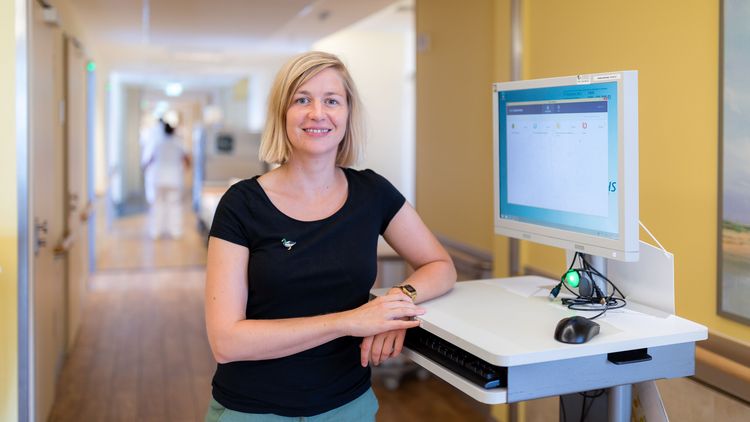The results of a medical procedure do not only depend on the doctors’ skills, but also on the organization of their working environment. Oldenburg University health services researcher Lena Ansmann is examining this factor.
On 13 December 1973 a highly controversial study appeared in Science magazine. Entitled “Small Area Variations in Health Care Delivery”, US epidemiologists made the astonishing observation that in a community of Vermont in the east of the US, 15 percent of all children up to 15 years of age had their tonsils removed, whereas in a neighbouring community that figure was four times higher. With other types of procedures, too, there were conspicuous variations in the per capita number of days spent in hospital and the cost of hospital stays.
It appeared that the more hospital beds were available in a community, the more procedures were performed. This result put paid to a number of popular notions about medical care, for instance that doctors make their decisions based solely on the current state of knowledge and the wellbeing of the patient. One conclusion from the study was that certain variations in the provision of healthcare services cannot be explained by medical factors lone but are clearly based on other factors, for example differences in the way individual hospitals are organized.
Why do mortality rates differ between hospitals?
But it is only in recent years that researchers have begun to focus more on these organizational differences. For there are still drastic regional variations in the frequency of certain types of surgeries today – and the causes for these and other, similar variations remain unclear. “The complication rates or mortality rates after a certain type of procedure can also vary from hospital to hospital,” says Prof. Dr. Lena Ansmann of the University of Oldenburg’s Department for Health Services Research. The professor is one of the few researchers in Germany who is systematically investigating how differences between organizations affect patient care. Ansmann’s Professorship of Organizational Health Services Research was created in 2017 and is the first to be explicitly dedicated to this area of research.
Ansmann is particularly interested in the relations between employees within an organization. In some cases her research projects even extend into the areas of special education and social work. Another focus of her research is oncological care. In the PINTU study (Patient involvement in multidisciplinary tumor conferences in breast cancer care), funded by the NGO German Cancer Aid and led by Ansmann and her colleague Nicole Ernstmann of the University Hospital Bonn, the focus is on so-called “tumour conferences”. These meetings are case reviews conducted either before or after a cancer surgery where doctors with different specialities discuss the patient’s prognosis and further treatment – for instance whether radiotherapy or chemotherapy is necessary.
Should patients take part in tumour conferences?
Normally the experts do this behind closed doors, but at certain hospitals that are specialised in breast cancer patients also take part in these meetings. “However, we don’t yet know whether this is a good idea,” says Ansmann. After all, the doctors use medical language when they talk to each other, and this can make patients who are often already very nervous even more anxious and stressed, she explains. And it is also unclear whether involving the patients in these conversations makes sense from the doctors’ point of view. An argument in favour of patients attending these meetings, however, is that they are better informed about the pros and contras of all the various options, and thus in a better position to decide which therapy to choose, she says.
In order to examine open questions like these, Ansmann and her colleagues interviewed doctors at various breast cancer centres. They want to find out which advantages and disadvantages the doctors see here and how they integrate patients into the discussions. “There are doctors who say: It’s a great idea, it should be done like this everywhere. The patients are totally happy with it,” Ansmann reports. Others, she says, focus more on the disadvantages – for example that the patient’s presence means that the situation can’t be discussed as openly, or that the tumour conferences are thus prolonged unnecessarily. “When we discuss this with clinical practitioners the topic is always highly contentious, which I find very exciting,” the researcher says. In the next step Ansmann and her team plan to interview patients before and after the conferences. With video recordings of the meetings, they want to find out how patients behave during the tumour conferences and how they feel afterwards.
„We want to step up research activities.“
In her new field of research Ansmann is trying to bring together scientists with a similar focus and connect them with each other. In the German Network for Healthcare Research (Deutsches Netzwerk Versorgungsforschung) she leads the working group “Organizational Health Services Research” and over the past two years has helped revise the standards for key methods in her field of research. A memorandum with the results will soon appear.
“We want to further consolidate this new field and step up research activities,” Ansmann explains. Thus, she is also involved in the project “Organizational Behaviour in Health Care Institutions in Germany” (NWOB), which is funded by the German Research Foundation (DFG). In this project twenty researchers from different disciplines – from general medicine to economics – have produced a book that provides a systematic overview of the current state of organizational health services research in Germany.


